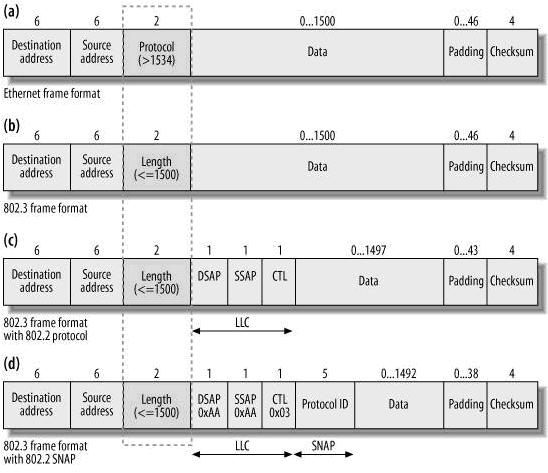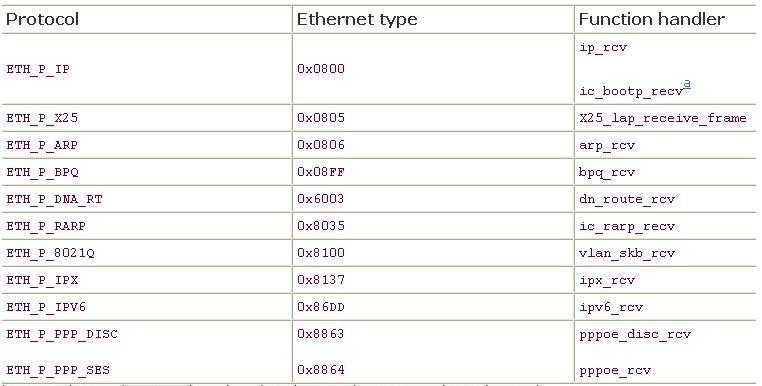Linux网络协议栈(四)——链路层(2)
2、协议相关
2.1、第3层协议的管理
在Linux内核中,有两种不同目的的3层协议:
(1) ptype_all管理的协议主要用于分析目的,它接收所有到达第3层协议的数据包。
(2) ptype_base管理正常的3层协议,仅接收具有正确协议标志符的数据包,例如,Internet的0x0800。

注意sb_buff与net_device中几个字段的区别:
sb_buff:
unsigned short protocol
高层协议从二层设备的角度所看到的协议,典型的协议包括 IP,IPV6和 ARP,完整的列表在 include/linux/if_ether.h。
unsigned char pkt_type
帧的类型,可能的取值都在include/linux/if_packet.h 中定义.
net_device:
unsigned short type
设备类型(以太网,帧中继等)。在include/linux/if_arp.h 中有完整的类型列表。
2.2、协议处理函数注册
当协议注册时,内核会调用dev_add_pack添加一个与之对应的packet_type数据结构:
 Codedev:网络设备。PF_PACKET套接字通常使用它在特定的设备监听,例如,tcpdump -i eth0 通过PF_PACKET套接字创建一个packet_type实例,然后将dev指向eth0对应的net_device数据结构。
Codedev:网络设备。PF_PACKET套接字通常使用它在特定的设备监听,例如,tcpdump -i eth0 通过PF_PACKET套接字创建一个packet_type实例,然后将dev指向eth0对应的net_device数据结构。
func:协议处理函数。
af_packet_priv:被PF_PACKET套接字使用。
当同一个类型的协议有多个packet_type实例时,输入的帧会被所有的协议处理函数处理。
IP协议的packet_type:
2.3、以太网帧(Ethernet)与802.3帧
老的以太网的帧的格式与标准和802.3标准的格式分别如下:

以太网的帧头(Ethernet frame header)的定义:
h_proto>1536的以太网类型:

2.4、eth_type_trans函数
2.1、第3层协议的管理
在Linux内核中,有两种不同目的的3层协议:
(1) ptype_all管理的协议主要用于分析目的,它接收所有到达第3层协议的数据包。
(2) ptype_base管理正常的3层协议,仅接收具有正确协议标志符的数据包,例如,Internet的0x0800。

注意sb_buff与net_device中几个字段的区别:
sb_buff:
unsigned short protocol
高层协议从二层设备的角度所看到的协议,典型的协议包括 IP,IPV6和 ARP,完整的列表在 include/linux/if_ether.h。
unsigned char pkt_type
帧的类型,可能的取值都在include/linux/if_packet.h 中定义.
net_device:
unsigned short type
设备类型(以太网,帧中继等)。在include/linux/if_arp.h 中有完整的类型列表。
2.2、协议处理函数注册
当协议注册时,内核会调用dev_add_pack添加一个与之对应的packet_type数据结构:
//include/linux/netdevice.h
struct packet_type {
unsigned short type; /* This is really htons(ether_type). */
struct net_device *dev; /* NULL is wildcarded here */
int (*func) (struct sk_buff *, struct net_device *,
struct packet_type *);
void *af_packet_priv;
struct list_head list;
};
type:协议类型,它可以取以下一些值。来看看if_ether.h中定义的协议的类型:struct packet_type {
unsigned short type; /* This is really htons(ether_type). */
struct net_device *dev; /* NULL is wildcarded here */
int (*func) (struct sk_buff *, struct net_device *,
struct packet_type *);
void *af_packet_priv;
struct list_head list;
};
func:协议处理函数。
af_packet_priv:被PF_PACKET套接字使用。
当同一个类型的协议有多个packet_type实例时,输入的帧会被所有的协议处理函数处理。
IP协议的packet_type:
//net/ipv4/ip_output.c
static struct packet_type ip_packet_type = {
.type = __constant_htons(ETH_P_IP),
.func = ip_rcv,
};
//在inet_init中被调用
void __init ip_init(void)
{
dev_add_pack(&ip_packet_type);
ip_rt_init();
inet_initpeers();
#if defined(CONFIG_IP_MULTICAST) && defined(CONFIG_PROC_FS)
igmp_mc_proc_init();
#endif
}
//net/core/dev.c
void dev_add_pack(struct packet_type *pt)
{
int hash;
spin_lock_bh(&ptype_lock);
if (pt->type == htons(ETH_P_ALL)) {
netdev_nit++;
list_add_rcu(&pt->list, &ptype_all);
} else {
hash = ntohs(pt->type) & 15;
list_add_rcu(&pt->list, &ptype_base[hash]);
}
spin_unlock_bh(&ptype_lock);
}
static struct packet_type ip_packet_type = {
.type = __constant_htons(ETH_P_IP),
.func = ip_rcv,
};
//在inet_init中被调用
void __init ip_init(void)
{
dev_add_pack(&ip_packet_type);
ip_rt_init();
inet_initpeers();
#if defined(CONFIG_IP_MULTICAST) && defined(CONFIG_PROC_FS)
igmp_mc_proc_init();
#endif
}
//net/core/dev.c
void dev_add_pack(struct packet_type *pt)
{
int hash;
spin_lock_bh(&ptype_lock);
if (pt->type == htons(ETH_P_ALL)) {
netdev_nit++;
list_add_rcu(&pt->list, &ptype_all);
} else {
hash = ntohs(pt->type) & 15;
list_add_rcu(&pt->list, &ptype_base[hash]);
}
spin_unlock_bh(&ptype_lock);
}
2.3、以太网帧(Ethernet)与802.3帧
老的以太网的帧的格式与标准和802.3标准的格式分别如下:

以太网的帧头(Ethernet frame header)的定义:
//include/linux/if_ether.h
struct ethhdr {
unsigned char h_dest[ETH_ALEN]; /* destination eth addr */
unsigned char h_source[ETH_ALEN]; /* source ether addr */
unsigned short h_proto; /* packet type ID field */
} __attribute__((packed));
struct ethhdr {
unsigned char h_dest[ETH_ALEN]; /* destination eth addr */
unsigned char h_source[ETH_ALEN]; /* source ether addr */
unsigned short h_proto; /* packet type ID field */
} __attribute__((packed));
h_proto>1536的以太网类型:

2.4、eth_type_trans函数
//net/ethernet/eth.c
unsigned short eth_type_trans(struct sk_buff *skb, struct net_device *dev)
{
struct ethhdr *eth;
unsigned char *rawp;
skb->mac.raw=skb->data;
skb_pull(skb,ETH_HLEN);
//取出以太网头
eth = eth_hdr(skb);
skb->input_dev = dev;
//设置帧的类型
if(*eth->h_dest&1) //广播和多播地址
{
if(memcmp(eth->h_dest,dev->broadcast, ETH_ALEN)==0)
skb->pkt_type=PACKET_BROADCAST;
else
skb->pkt_type=PACKET_MULTICAST;
}
/*
* This ALLMULTI check should be redundant by 1.4
* so don't forget to remove it.
*
* Seems, you forgot to remove it. All silly devices
* seems to set IFF_PROMISC.
*/
else if(1 /*dev->flags&IFF_PROMISC*/)
{
if(memcmp(eth->h_dest,dev->dev_addr, ETH_ALEN))
//如果帧的目标地址与网络设备的mac地址不同
skb->pkt_type=PACKET_OTHERHOST;
}
if (ntohs(eth->h_proto) >= 1536)
return eth->h_proto;
rawp = skb->data;
/*
* This is a magic hack to spot IPX packets. Older Novell breaks
* the protocol design and runs IPX over 802.3 without an 802.2 LLC
* layer. We look for FFFF which isn't a used 802.2 SSAP/DSAP. This
* won't work for fault tolerant netware but does for the rest.
*/
//IPX数据包没有802.2标准的LLC层,0xFFFF为其标志位
if (*(unsigned short *)rawp == 0xFFFF)
return htons(ETH_P_802_3);
/*
* Real 802.2 LLC
*/
//802.2标准的LLC协议
return htons(ETH_P_802_2);
}
该函数主要设置数据帧的类型,返回协议的类型。unsigned short eth_type_trans(struct sk_buff *skb, struct net_device *dev)
{
struct ethhdr *eth;
unsigned char *rawp;
skb->mac.raw=skb->data;
skb_pull(skb,ETH_HLEN);
//取出以太网头
eth = eth_hdr(skb);
skb->input_dev = dev;
//设置帧的类型
if(*eth->h_dest&1) //广播和多播地址
{
if(memcmp(eth->h_dest,dev->broadcast, ETH_ALEN)==0)
skb->pkt_type=PACKET_BROADCAST;
else
skb->pkt_type=PACKET_MULTICAST;
}
/*
* This ALLMULTI check should be redundant by 1.4
* so don't forget to remove it.
*
* Seems, you forgot to remove it. All silly devices
* seems to set IFF_PROMISC.
*/
else if(1 /*dev->flags&IFF_PROMISC*/)
{
if(memcmp(eth->h_dest,dev->dev_addr, ETH_ALEN))
//如果帧的目标地址与网络设备的mac地址不同
skb->pkt_type=PACKET_OTHERHOST;
}
if (ntohs(eth->h_proto) >= 1536)
return eth->h_proto;
rawp = skb->data;
/*
* This is a magic hack to spot IPX packets. Older Novell breaks
* the protocol design and runs IPX over 802.3 without an 802.2 LLC
* layer. We look for FFFF which isn't a used 802.2 SSAP/DSAP. This
* won't work for fault tolerant netware but does for the rest.
*/
//IPX数据包没有802.2标准的LLC层,0xFFFF为其标志位
if (*(unsigned short *)rawp == 0xFFFF)
return htons(ETH_P_802_3);
/*
* Real 802.2 LLC
*/
//802.2标准的LLC协议
return htons(ETH_P_802_2);
}



 浙公网安备 33010602011771号
浙公网安备 33010602011771号